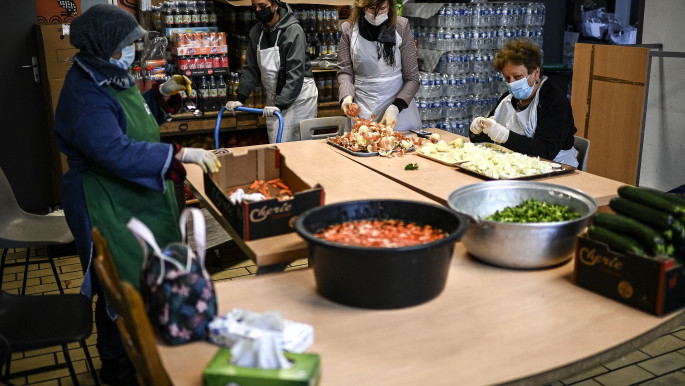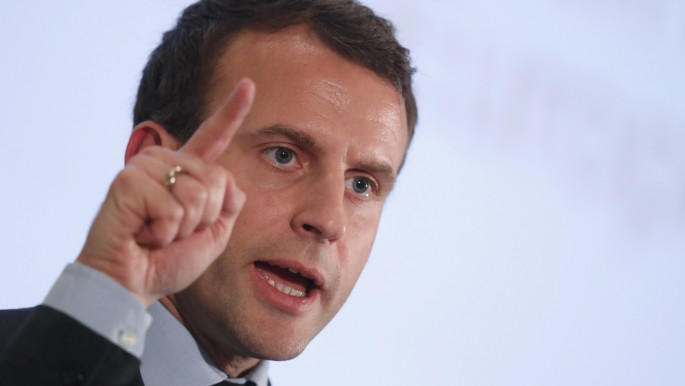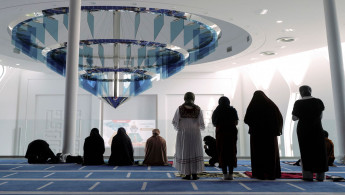In France, Ramadan is celebrated with caution as Muslims withstand hostile social tensions
It is with a tweet asking, "It's in a few days I wanted to be sure, are we allowed to do Ramadan", directed to the French government, that comedian artist Jason Brokerss addressed, with humour but not without sarcasm, the politics led by France against its Muslim population.
In just a few months, the government has more or less directly targeted French Muslims through declarations and decisions but also with laws, most notably the "anti-separatism" bill that aims at strengthening oversight of mosques, schools and sports clubs to safeguard France from radical Islamists and ensure respect for French values.
On April 12, the Senate, dominated by the right-wing opposition, adopted the bill after having clearly toughened it, with measures such as forbidding the hijab for parents in schools outings, under age girls in public spaces and the burkini at the swimming pool, prayers in universities and even displaying another flag than the French one at weddings.
 |
We hear declarations on Muslims all year long, but it doesn't prevent us from living our life. We work here, we have mixed families, we are part of France, and we're celebrating Ramadan as much as the health measures allow us to |  |
"I don't see separatism, it's only for the politicians," said Merabti Salah, president of the Islamic committee of the central department Indre-et-Loire, jokingly to The New Arab.
"We hear declarations on Muslims all year long, but it doesn't prevent us from living our life. We work here, we have mixed families, we are part of France, and we're celebrating Ramadan as much as the health measures allow us to."
With a national curfew at 7pm, Salah's biggest worry is to be able to provide food to the poorest members of the community, especially the students, with authorisations given by the local governance.
|
"I don't think there is more racism in France than anywhere else," he added. "It's the politicians' problem, they have no real and coherent solutions to offer to everything else so they stoke the fire, they always end up back on the Muslims."
Just three days before the Senate vote, a mosque in Rennes was defaced with Islamophobic graffiti, and another one damaged with fire in Nantes, western France.
The only way for some believers to go on with their faith without feeling fear or frustration is to, simply, avoid the news.
"We do, like most Muslims, when it's about us on the news we skip!" Rahma, 29-years-old, told The New Arab. "Life doesn't evolve around the media, otherwise you get crazy. So you surround yourself with benevolent people and move on."
She lives in Marseille and said that Islamophobia is not as present in her daily life as it would be some place else. According to Marseille municipality, around 300,000 Muslims live in the second city of France, which counted nearly 800,000 people last year.
Others don't manage to distance themselves with what they see and hear on the news, and can't wait for some relief.
"I've never experienced such a detestable atmosphere," Mamadou Daffe, imam in the Mirail neighbourhood of Toulouse in southwest France, told The New Arab. "We felt that it was coming with Zemmour on TV and such, but for the current government to decide such measures, we didn't expect that it would go that far. It's just giving room for the far-right in the next elections."
Daffe referred to Eric Zemmour, a so-called "polemicist" who was fined 3,000 euros for inciting religious hatred after anti-Muslim remarks made in 2016. Since 2019, he animates a daily show on the channel CNews, famously known for inviting anti-Muslim guests.
"All that the government is achieving is pushing Muslim people to the limit, all those decisions to fight separatism are perceived as attacks and it's very sad, as most of us just want to live in peace in their own country like everybody else," Daffe added. "Ramadan is very welcome to calm the spirits and find solace in our faith, especially in a tense moment like today."
 |
The French version of secularism, 'laïcité', is meant to ensure religious freedom, but is increasingly used by the state to rule against practices shared by many Muslims in the country |  |
He mentioned that the pressure was mostly on Muslim women who wear the hijab, saying that they suffer from negative attention, comments and sometimes physical attacks.
Last October, two veiled women were attacked by a knife when walking near the Eiffel Tower. Veiled journalist Nadiya Lazzouni filed a complaint on April 14 after receiving death threats for defending the right for Muslim mothers wearing the hijab to go for schools outings. She received a letter notably saying "No illusion shitty race. France will be virgin of all Muslims and Islamists".
Read more: Separatism: Bringing Islam and France's Muslims to heel
"Amid a pandemic that killed over 100,000 people in France, they [the politicians] still find the time to speak about veiled women… I don't know, why wouldn't they talk about something that actually interests people? I feel weariness but also stupefaction that we're still at that level," Khalid, 40-year-old and believer practicing in Mirail, told The New Arab.
 |
|
 |
|
| Volunteers of the Une Chorba Pour Tous (A soup for everyone) NGO distribute food parcels on the first day of Ramadan in Paris [Getty] |
 |
Amid a pandemic that killed over 100,000 people in France, they [the politicians] still find the time to speak about veiled women |  |
In order to find peace, Khalid doesn't speak to people who are not Muslims about his faith "unless they ask", and feels that he has to give an exemplary image. "I feel fully French and fully Muslim, it shouldn't be opposed but I feel it's best to show 'good behaviours', as a sort of Muslim ambassador," he added.
 |
| Read also: Liberty, equality and fraternity are not for everyone |
Other Muslims feel more and more threatened and fear that the youth might react to these constant attacks against their community.
"If you would have asked me last year, I would have told you it's impossible for it to get worse," Faker Korchane, co-founder and vice-president of the Fatima mosque in Paris, told The New Arab.
"It's so tense! There is the political bet that attacking the Muslim community will get you political gains. But in the end, secularism has never been so much threatened than by this logic of overbidding."
Korchane referred to the French version of secularism, "laïcité", which is meant to ensure religious freedom but is increasingly used by the state to rule against practices shared by many Muslims in the country.
 |
I feel that people are more afraid to open up about their religion in a non-familiar or relaxed space |  |
"Around me, I feel that people are more afraid to open up about their religion in a non-familiar or relaxed space," he added.
"Right now there is such a growing hysteria, I wait to see what will happened with the debates in a while but I can feel a growing frustration, especially from the youth. We often underestimate what teenagers hear and understand. We talk about their mothers, sisters, friends, as alienated or radicalised for wearing the veil. How is it going to translate itself in the future? All I see is that the more the government pushes, the more the community closes itself."
Follow her on Twitter: @FlorenceMassena



